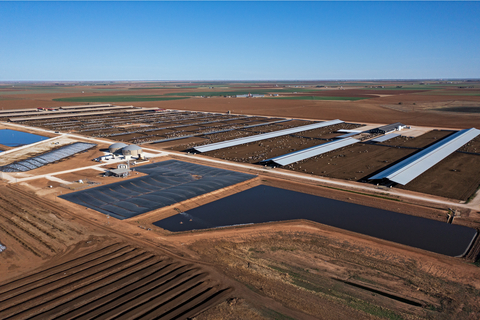Clean Energy’s First Renewable Natural Gas Facility Begins to Sell Environmental Credits
Digester at Del Rio Dairy in

Del Rio Dairy (Photo: Business Wire)
“The demand for RNG is only increasing,” said Clay Corbus, senior vice president of renewables at Clean Energy. “There is no easier or immediate way for fleets to achieve their goals to reduce carbon emissions than transitioning their trucks, buses, or other large vehicles to RNG. Turning the challenge of managing manure at large dairies like Del Rio Dairy into something so positive like an ultra-low carbon fuel is a huge win for all parties.”
Clean Energy broke ground at the Del Rio Dairy biogas digester in November 2021, completed construction in February 2023, and stored the RNG produced until regulatory approval in June. Del Rio Dairy is the first low carbon-intensity RNG project completed by Clean Energy and was financed through a joint venture between Clean Energy and TotalEnergies. The multi-generational, family-owned and operated dairy has 7,500 milking cows.
Agriculture accounts for nearly 10 percent of
About Clean Energy
Clean Energy Fuels Corp. is the country’s largest provider of the cleanest fuel for the transportation market. Our mission is to decarbonize transportation through the development and delivery of renewable natural gas (RNG), a sustainable fuel derived from organic waste. Clean Energy allows thousands of vehicles, from airport shuttles to city buses to waste and heavy-duty trucks, to reduce their amount of climate-harming greenhouse gas. We operate a vast network of fueling stations across the
About TotalEnergies
TotalEnergies is a global multi-energy company that produces and markets energies: oil and biofuels, natural gas and green gases, renewables and electricity. Our more than 100,000 employees are committed to energy that is ever more affordable, cleaner, more reliable and accessible to as many people as possible. Active in nearly 130 countries, TotalEnergies puts sustainable development in all its dimensions at the heart of its projects and operations to contribute to the well-being of people.
Forward-Looking Statements
This news release contains forward-looking statements within the meaning of Section 27A of the Securities Act of 1933 and Section 21E of the Securities Exchange Act of 1934 that involve risks, uncertainties and assumptions, including without limitation statements about amounts of natural gas expected to be produced or consumed; numbers of vehicles expected to be deployed, fueled, maintained, or financed; the environmental and other benefits of Clean Energy’s fuels; the timing and scope of construction, maintenance, and other projects; and the impacts of legislative and regulatory developments. Actual results and the timing of events could differ materially from those anticipated in these forward-looking statements. The forward-looking statements made herein speak only as of the date of this press release and, unless otherwise required by law, Clean Energy undertakes no obligation to publicly update such forward-looking statements to reflect subsequent events or circumstances. Additionally, the reports and other documents Clean Energy files with the SEC (available at www.sec.gov) contain risk factors, which may cause actual results to differ materially from the forward-looking statements contained in this news release.
View source version on businesswire.com: https://www.businesswire.com/news/home/20231031446345/en/
Media Contact:
Gary Foster
(949) 437-1113
Gary.Foster@cleanenergyfuels.com
Investor Contact:
Thomas
949-437-1191
thomas.driscoll@cleanenergyfuels.com
Source: Clean Energy Fuels Corp.







